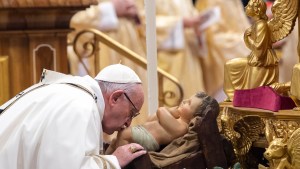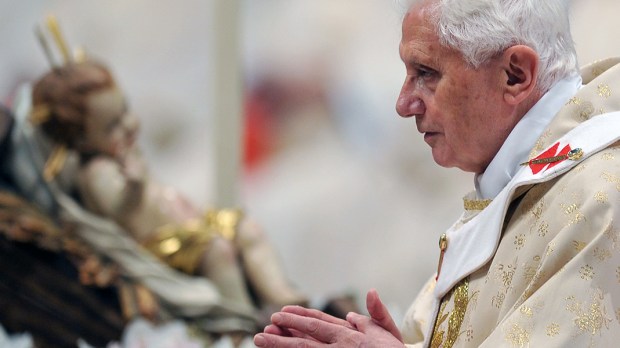At the beginning of each Sunday Mass, Catholics typically sing (or recite) the “Gloria,” using verses taken directly out of the Gospel of St. Luke. It begins with the words of the angels who glorified God when Jesus was born, “Glory to God in the highest and on earth peace to those on whom his favor rests” (Luke 2:14).
It is an angelic hymn, one that has been lifted up as the “perfect” song of praise, as it derives directly from angels who are always in the presence of God.
In reflecting on this heavenly hymn, Pope Benedict XVI saw it as an example of music that comes from a heart full of love. He explained his thoughts about the Gloria in a homily for Midnight Mass in 2010.
Saint Luke does not say that the angels sang. He states quite soberly: the heavenly host praised God and said: “Glory to God in the highest” (Lk 2:13f.). But men have always known that the speech of angels is different from human speech, and that above all on this night of joyful proclamation it was in song that they extolled God’s heavenly glory. So this angelic song has been recognized from the earliest days as music proceeding from God, indeed, as an invitation to join in the singing with hearts filled with joy at the fact that we are loved by God.
Unfortunately, often when we sing the Gloria, it is not with a heart “filled with joy.” Instead, we sing out of habit and do so without ever thinking about the words we say.
Pope Benedict would like us to reexamine our motivation and to sing with both joy andlove.
Cantare amantis est, says Saint Augustine: singing belongs to one who loves. Thus, down the centuries, the angels’ song has again and again become a song of love and joy, a song of those who love. At this hour, full of thankfulness, we join in the singing of all the centuries, singing that unites heaven and earth, angels and men. Yes, indeed, we praise you for your glory. We praise you for your love. Grant that we may join with you in love more and more and thus become people of peace.
The Church, in her wisdom, refrains from singing the Gloria during Advent and Lent, reserving it for the feasts that these two penitential seasons prepare for. This helps us on a natural level to prepare our hearts to sing the Gloria loudly, with great joy and love, when we are allowed to sing it again. It makes Christmas even more special, as the entire Church explodes in jubilant praise.
This Christmas, let us reflect on our own hearts as we sing the Gloria and try to be joyful, allowing the song to be a response of love, to the God who loved us first.

Read more:
How someone’s poem became the greatest hymn of the Mass

Read more:
10 Inspiring quotes from recent popes about the wonder of Christmas

